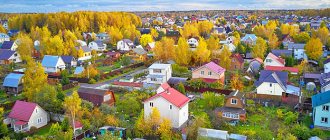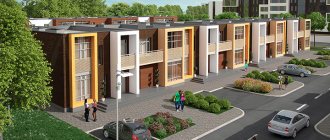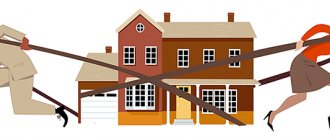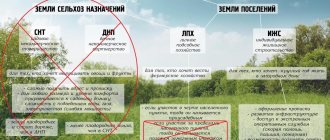Amount of taxes. Where to look for answers?
The norms of tax legislation are generally contained in the Tax Code of the Russian Federation. This is a set of rules, concepts and relationships that provide answers to general questions.
Rates, benefits and requirements for paying taxes for a specific site are contained in the regulations of local authorities. Consequently, you can find specifics on taxation issues for a particular area in them.
It is noteworthy that the documents have short-term validity and can be canceled by new acts, so when paying a fee it is worth taking into account the latest editions of the documents. If changes are made to the rules and regulations, the authorities notify the owners.
Who is required to pay taxes and when?
When concluding a purchase and sale transaction for a house and land, both the buyer and the seller are subject to taxation. Everyone has obligations to the state. The seller of real estate must pay personal income tax, since he receives a monetary profit from the transaction. The rate on an individual’s income is fixed and amounts to 13% of the amount specified in the contract.
If they want to avoid paying this tax, some owners formalize the purchase and sale through a gift agreement. It is worth considering that in this case, the responsibility to pay personal income tax falls on the buyer. There are exceptions to this chain - close relatives and persons who have owned the property for a long period of time (more than 5 years) are exempt from foreclosure.
If the parties to the transaction want to be exempt from taxation, they must provide proof of their relationship and support this with documents. Tax payment is carried out during the re-registration of documents. You can find out all the details directly from the notary.
Complete tax instructions for summer residents have been published
What's new?
Owners of country real estate are required to pay taxes on land, house and outbuildings, provided that these are permanent buildings. But, of course, there is no need to register everything that you have on your site for cadastral registration, experts say. Although some owners think that if they register a house, utility block, bathhouse and even a gazebo, then their hacienda will significantly increase in price. Maybe that’s true, but then you’ll have to pay a hefty tax on all this stuff. You should always remember that the tax base is formed based on the cadastral value of real estate.
The last cadastral assessment in the Moscow region took place in 2018. Then the cost of about 8.4 million capital construction projects and 3.9 million land plots was adjusted. Based on this data, taxes for 2021 were generated, and we will pay them this year.
There is no need to be afraid ahead of time that the amount of taxes will certainly increase. It is quite possible that just the opposite will happen. In remote areas of the Moscow region, the market value of real estate has fallen, so taxes have also decreased. By approximately 10–15% compared to the previous period. And on average, the tax for a dacha near Moscow is approximately equal to the tax for a Moscow apartment, which is probably fair, because for many this is a full-fledged second home with all the amenities plus a plot of land. We have all seen how valuable this last option is during the quarantine.
The preliminary results of the state cadastral valuation can already be found on the Rosreestr website; to do this, you need to enter the cadastral number of your property. If you think that the value of your land plot or house is too high, you can appeal it, and it is not at all necessary to go to court because of this; it is enough to contact the Cadastral Valuation Center for an explanation of the cadastral value. Detailed instructions on how to do this are on their website.
Errors in estimation can occur for various reasons. For example, a cadastral engineer conducted an assessment without visiting the site and did not take into account the individual characteristics of your site, but derived the “average temperature in the hospital.” One has a dry plot, as it is located on a hill, another has a low-lying plot, so it is constantly flooded - there are many such details that affect the market value.
A frequent reason for errors during assessment is the lack of clear boundaries of a land plot. If land surveying was not carried out in SNT, then it will be impossible to determine the exact location of a specific site. In addition, the assessment is carried out on the basis of those characteristics of the object that are indicated in the Unified Register, and they are also not always correct. So don’t be lazy to go to the Rosreestr website and check whether everything indicated there regarding your property is correct, and if an error has crept in, ask for it to be corrected by providing supporting documents.
Photo: Social networks
Pay or you'll regret it
The tax base includes only registered property objects: buildings and plots of land, information about which is entered into Rosreestr at the request of the owner (sometimes data about them is also transferred to the Federal Tax Service from the BTI). But let’s be honest: many summer residents are in no hurry to register their dachas and pay taxes for them.
Up to 40% of country houses, bathhouses and garages in the Moscow region are not listed in any official databases, so their owners do not pay taxes. And in vain. Local authorities no longer want to put up with this situation. Since 2021, a law has come into effect according to which the tax on individual housing construction land is doubled if the owner of the land does not register the house for more than 10 years. The regional authorities were forced to take this step so that the owners could quickly register their country real estate. And in general the process went faster.
Over the past two years, more than 150 thousand unregistered buildings have been identified in the Moscow region. Most of them were in Solnechnogorsk, Ramensky and Chekhov districts. Tens of thousands of buildings have already been registered in the cadastral register, and their owners have paid the treasury a total of hundreds of millions of rubles in taxes. And this year, regional authorities hope to legalize thousands more unregistered dachas and cottages.
According to the First Deputy Chairman of the Moscow Regional Duma, Chairman of the Union of Summer Residents of the Moscow Region Nikita Chaplin, real estate registration primarily protects the rights of the summer residents themselves, and for municipalities it is an opportunity to provide Moscow region residents with the necessary infrastructure at the expense of tax revenues, because land tax and property tax for individuals go to local budgets, thanks to which it is possible to repair access roads and build social facilities.
“I had already started preparing documents to register my dacha, but then Covid intervened, the MFCs closed, everything stopped,” laments a pensioner from Chekhov. According to him, registering a house is not a cheap pleasure. He had to pay his entire pension for calling a cadastral engineer, and now the man is afraid that because of the epidemic, he may not have time to register his property in a simplified manner - under the dacha amnesty. But he hopes that the authorities will once again extend her sentence, because so much time was wasted due to the malignant virus.
General Director of the Moscow Regional BTI Roman Larin told MK that in 2021 a number of promotions were launched that will allow summer residents to register real estate in MOBTI with discounts or even for free.
“We provide services to veterans of the Great Patriotic War free of charge. Each of them can contact us for advice and register real estate in the Moscow region. They don’t need to go anywhere, our employees will come and arrange everything themselves,” says Larin. He also reported on the current benefit for large families, which are given a 20% discount on a number of services; SNT members also receive a discount when applying collectively.
Taxes and benefits
“The topic of property registration is directly related to taxation. However, you should not be afraid of this, since not all real estate in SNT needs to be registered in the cadastral register. In addition, real estate, which by law must be registered, is subject to federal benefits and deductions,” says Natalya Adigamova, Minister of Property Relations of the Moscow Region.
All owners are exempt from tax for 50 sq.m of a residential building and for one outbuilding up to 50 sq.m. Moreover, if you have a bathhouse with an area of 40 sq.m. and a summer house of 30 sq.m. on your site, then you will not have to pay for any of these buildings.
And preferential categories of citizens - pensioners, veterans and others - are exempt from property tax for one residential building, one garage and one outbuilding. At the same time, they can claim the benefit starting from pre-retirement age - women from 55 years old, and men from 60. Also, pensioners from 2021, and large families from 2021 have the right to a tax deduction for 6 acres of land, which are also not are taxed. But for all other property you will have to pay taxes, but not more than 0.3% of the cadastral value of the property.
Another good news for summer residents - from 2021, the tax rate on general purpose land in SNT (roads, playgrounds and turning areas) will be subject to land tax at a reduced rate (0.3% instead of 1.5% of the cadastral value).
And, of course, rumors that this year they will start charging summer residents a tax for their harvest are nothing more than empty rumors. If you sell vegetables and fruits from your plot, you will not pay anything. Resellers are a completely different matter; for them this is an entrepreneurial activity, on which, of course, taxes must be paid. Just in case, Nikita Chaplin advises getting a certificate from the SNT board stating that you have a plot of land so that you can present it on the market.
By the way, while some summer residents are in no hurry to register their property and pay taxes on it, others have rushed and registered everything they need and don’t need on their own behalf. Including even the fence... In this case, the tax receipt, of course, can come as a shock, but there is no one to blame but yourself. After all, if you put all buildings on the cadastral register, including an old barn and an abandoned well, taxes will be charged on all objects, and without any benefits, because the rate on outbuildings is much higher than on a house. It is 0.5 percent. The amounts, of course, individually will be meager, but together they can result in a decent, and most importantly, completely unnecessary waste of money.
As a rule, the Ministry of Property explained to MK, those summer residents who want to privatize the rented plot put their outbuildings on the cadastral register. After the land becomes a property, these owners try to deregister their barns so as not to pay taxes on them. These are such cunning people.
HELP "MK"
Every Friday at 14.00, as part of the “Digital SNT of the Moscow Region” project, online sessions with residents of SNT near Moscow are held on the Instagram account of the Union of Summer Residents of the Moscow Region. They discuss important issues for summer residents, clarify innovations in legislation, and understand the nuances of land and property relations. The project was created with the support of the Ministry of Property Relations of the Moscow Region, the Union of Summer Residents of the Moscow Region and the Moscow Regional BTI.
MEANWHILE
Since May 18, branches of the Moscow Regional BTI have opened to receive citizens; applications for services are also accepted online and on the institution’s website. All work is carried out in compliance with safety precautions in accordance with the high-alert regulations.
Taxation of land plots
By purchasing a country house, the buyer receives at his disposal a plot of land (adjacent territory). The tax services already have data on it; it has a cadastral number and certain boundaries.
At the same time, the new owner is required to pay land tax in the following cases:
- if the site is privatized;
- received on the basis of perpetual use rights;
- is in lifelong possession.
Land tax must be paid annually. The amount is calculated individually, depending on the cadastral value of the site. The Tax Code sets the maximum permissible rates. You can find restrictions in Art. 394.
If you buy a house on land that does not fall under the categories of agricultural land, private household plots, peasant farms, then the rate for annual payment will be a maximum of 0.3% of the cadastral value of the plot. You can find it out on the website: pkk5.rosreestr.ru.
Which outbuildings are taxed and which are not?
So, guided by the instructions of the tax authorities themselves (previous chapter), the summer resident will pay for:
• permanent residential building on a land plot – pay;
• bathhouse with foundation (size from 50 sq. m) – pay;
• permanent shed with an area of 50 sq. m. m – pay;
• barn without a foundation - do not pay;
• toilet (if it is a toilet type) - do not pay;
• greenhouse – do not pay;
• non-permanent garage (open, closed) – do not pay;
• gazebo – do not pay;
• greenhouse – do not pay;
• fence – of course, do not pay.
Ownership of the building is the main condition that governs the tax authorities.
Payment procedure
The presence of buildings on the site is secondary, since the owner can buy land for development or receive a site with a house on it.
If you purchased land and built a house on it, then you need to pay tax on it in the next reporting period. For example, if you build a house in the fall of 2021, you pay from the beginning of 2021. At the same time, the house is considered built only after it has been put into operation and the relevant documents have been received.
When buying a house on a plot, the tax amount for the current year is divided between the seller and the buyer. As a rule, payment must be made before November of the current year.
If you are worried about payment deadlines, remember that the tax authorities send out notices about this. The amount of tax you pay in a particular case depends on the inventory value of the property. This figure is indicated in the technical inventory documents of the house. The tax office receives information about the object automatically from departmental organizations.
Legislation on the tax base
So which of the above is true and which is fiction? Firstly, we need to remember that the tax on country houses dates back to 1992. In order to find out the tax base, you need to refer to the legislation.
The object of taxation, according to the law on property tax for individuals, has remained virtually unchanged. Just as before, it is any real estate:
- House;
- apartment;
- country house;
- garage;
- other buildings.
An important note made in Articles 1 and 2 of the law is that only owners pay this tax. Only those types of property that are registered in Rosreestr are considered property. Previously, the owner received a Certificate of Ownership after the registration procedure. Now - a legally equivalent extract from the Unified State Register of Real Estate.
In other words, only those buildings that can be registered in the state cadastre and obtain title to them are subject to tax. These can only be permanent buildings.
Capital buildings differ from temporary ones in that they have a strong foundation and long-term purposes for their use. There are several types of permanent buildings, but the main ones are residential and non-residential. All other buildings that present an unstable appearance and non-permanent purpose are classified as temporary.
Article 406 of the Tax Code of Russia (TC RF) supplements the tax base with the following objects:
- unfinished construction projects;
- a set of buildings that includes one or more residential buildings;
- outbuildings.
It remains to find out what kind of buildings we are talking about. Will grandparents really pay for every dilapidated building that is loudly called a greenhouse or barn? Representatives of the Ministry of Finance provide detailed explanations on this matter in the media.
How is land tax paid?
The owner of the land plot does not have to calculate the payment himself. The responsible authorities draw up a notification of the date and amount of payment based on the information available in the database. The rate depends on the current legal norms in the region. Notifications are sent to the owner in advance (3 tax periods in advance).
If you do not receive receipts from the tax authorities, then, in the future, you can compensate for the missing amount, but not more than for 3 years of ownership of the property. Only private entrepreneurs and organizations are required to independently calculate taxes.
Which country buildings will be taxed and which will not?
So, bathhouses, sheds, greenhouses and other structures are the property of citizens, which is located on their summer cottages. We are not talking about a permanent building, but about economic facilities.
There was news in the media that the Russian Ministry of Finance introduced a new tax on bathhouses and sheds, which began to work in 2021. In addition, summer residents are required to declare the presence of outbuildings on their plots. This message was interpreted by the owners themselves to mean that now they would have to pay not only for bathhouses and sheds, but also for greenhouses, summer kitchens and toilets.
After numerous questions from summer residents to the Ministry of Finance, the officials themselves hastened to clarify.
What are the benefits?
At the moment, the following preferential conditions for land taxation are provided for plots with houses:
- Religious, public organizations, communities of disabled people (with a membership of more than 80% of people with disabilities) and charitable associations are exempt from payment;
- Territories inhabited by small peoples (Far East, Siberia) are being liberated. These are lands for cultural development, management and preservation of the way of life of indigenous people;
- Preferential taxation (reduction of the tax base by 10 thousand rubles) is provided for categories of veterans and disabled people of the Great Patriotic War and military operations, people with disabilities since childhood, holders of the title of Hero of the Soviet Union, full holders of the Order of Glory and Heroes of the Russian Federation, as well as disabled people of groups I, II, III.
Using an example, we can consider how restrictions and benefits work: if the cadastral value is equal to 1.5 million rubles. for a plot in the Moscow region, then taking into account the limitation of 0.3% and benefits for the disabled, the tax will be:
(1,500,000 – 10,000) x 0.3% = 1,470 rubles
The owner of the plot is required to pay this amount for the year.
Preferential categories
Preferential categories of citizens for property tax:
- Heroes of the Russian Federation and the USSR, having the Order of Glory of three degrees.
- Disabled since childhood, disability groups I and II.
- WWII participants.
- Victims after the disaster at the Chernobyl nuclear power plant, the accident at Mayak, after nuclear tests in Semipalatinsk.
- Military personnel whose service life is 20 years or more.
- Family members of military personnel who have lost their breadwinner.
- Pensioners.
- Citizens who performed international duty in Afghanistan.
- Parents and spouses of those who died in the military who died in the line of duty.
- Persons whose creativity is used in organizing exhibitions.
- Individuals who own buildings. Their area does not exceed 50 m2. They are located on the lands of SNT, private household plots, individual housing construction.
As you can see, pensioners are included in the preferential category of citizens. Benefits are taken into account only if the owner of the building applies to the tax office. Before November 1, they choose any object that will be eligible for the benefit.
How is property tax (dachas, houses, cottages) paid?
Firstly, the category of such objects includes not only a house or cottage, it also includes adjoining buildings, utility rooms, garages, as well as shares in the ownership of such property.
Data about your assets is kept by the authorities conducting the inventory. Qualified persons submit updated data each year by March 1st. Based on these amounts, the tax amount is calculated.
In relation to real estate tax, the norms of municipal legislation apply, as well as the “Law on Taxes on Property of Individuals”, which distributes the burden as follows:
- with a property value of up to 300 thousand rubles. paid up to 0.1%;
- if buildings are valued at 300 - 500 thousand rubles, then a rate of 0.1 - 0.3% is already provided;
- houses and objects costing from 500 thousand rubles. are taxed at a rate of 0.3 to 2%.
As a rule, the property owner receives a notification from the regulatory authority before August. If you have not received the appropriate receipt, you can contact your local administration.
Real estate taxes are also assessed at preferential rates for participants in the Great Patriotic War, pensioners, disabled people and certain categories of military personnel.
The difference between residential and non-residential premises
Non-residential premises are intended for different needs. It can be commercial, administrative, warehouse. It is not intended for permanent residence, and you cannot register there. Additional fire, sanitary and epidemiological safety requirements may be established for non-residential facilities.
As for real estate on garden plots, such objects as garden houses and outbuildings are considered non-residential.
Types of residential premises are listed in Art. 16 Housing Code of the Russian Federation. These include:
- A house or part of a house.
- Apartment or part of an apartment.
- Room.
These properties are intended for permanent residence. They also have requirements established by the Decree of the Government of the Russian Federation of January 28, 2006 No. 47 “On approval of the Regulations...”.
Benefits in the form of tax deductions
Depending on the nature of the transactions, additional deductions may be provided for the purchase and sale of land and houses. Detailed information on these deductions can be obtained individually from tax office employees.
All calculation amounts are made on the basis of the cadastral value, and it depends on market conditions. Therefore, property owners should be prepared for rising rates.
If you bought property worth no more than 2 million rubles, you have the right to receive compensation from the state. Benefits are also provided provided that you purchased similar property with funds received from the purchase and sale transaction. For example, we bought a neighboring house or plot for dacha management.
New orders in SNT
Now contributions to SNT in 2021 are accepted only by bank transfer. All dacha and garden cooperatives were required to open a current account. Therefore, if you are asked to deposit cash, then this is an offense.
The law establishes only two types of payments - membership fees to SNT and targeted contributions to SNT. That is, now no additional payments, despite the importance of the reason, can be established.
Membership fees to SNT should decrease slightly in 2021 due to a reduction in the rate on public land from 1.5 to 0.3%. Public areas include roads, playgrounds, sports grounds, and beaches.
Good news for summer residents who are not members of gardening partnerships. Now their membership fees to SNT will be reduced by taxes levied on SNT as a legal structure. That is, the partnership must now document the expenses incurred.
What awaits taxpayers this year?
- Since 2021, there have been changes in relation to country houses and garden plots. When buying and selling these objects, you will have to pay personal income tax in the amount of 13% for Russians, and up to 30% for foreign citizens and those who have not been in the country for a year;
- Continuous ownership of a plot of land, which was previously calculated at 3 years, is now calculated at five. This means that tax relief for the payment of income tax can only be received by persons who have owned land for more than 5 years (however, this norm does not apply to persons who received real estate from a spouse, a close relative, on a lifelong maintenance basis or through privatization);
- Pensioners are still forced to pay taxes on the use of their country house and the land underneath it. There are no tax benefits for this category this year.
In this article we described the main points, general formulas and recommendations for paying taxes on dachas, houses and plots. You can obtain complete information regarding the taxation of specific property on the website nalog.ru, as well as from the tax authorities at your place of residence.
Did you find this article helpful? Please share it on social networks: Don't forget to bookmark the Nedvio website. We talk about construction, renovation, and country real estate in an interesting, useful and understandable way.
Registration of buildings
According to the Civil Code, ownership of any real estate arises from the moment it is officially registered. Federal Law No. 122 “On state registration of rights to real estate and transactions” explains in detail the nuances of this procedure.
Each constructed structure (most often we are talking about residential buildings and garages) is not automatically entered into the Rosreestr database. First, the owner of the land receives permission to build them, and then with this permission he can register the property (including unfinished construction). If the owner of a land plot wants to register any outbuilding or block of buildings, he can submit an application to Rosreesr or the MFC. But, since most often such a land owner does not have special permission to build a barn, bathhouse or toilet, the owner of the site must contact a specialized organization where cadastral engineers work. An agreement is concluded under which a cadastral engineer goes to the site and draws up documentation for the buildings. All information is entered into the state cadastre database, and after that the object appears on the public cadastral map.
Such cases are rare; most often they are associated with conducting commercial activities, when registration becomes necessary. The services of cadastral engineers are not cheap. Therefore, rarely do ordinary citizens resort to such a burdensome and unnecessary procedure. It must be borne in mind that only after such a procedure a citizen (as the owner of this building) is obliged to pay tax on buildings. This means that the worries of summer residents about their dachas are unfounded.









